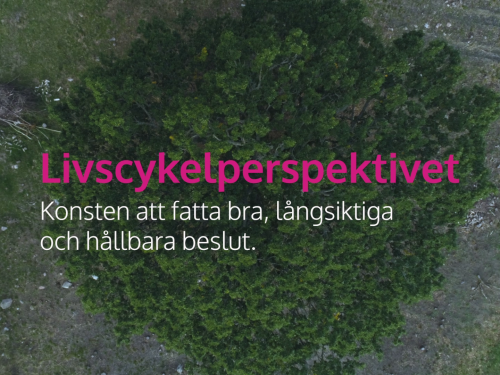Swedish platform for the life cycle perspective
This project aims for a joint national collaboration to engage organizations to apply a life cycle perspective.
Background
A common platform for knowledge building and collaboration is crucial to spread and develop the life cycle thinking globally. The project Swedish platform for life cycle perspective aims to stenghten the Swedish collaboration and to engage more organizations to apply a life cyle perspective. This is done by partners and collaborations partners through several activities, such as; network conferences, seminars, webinars, education, initiating research projects, collaboration and communication activities.
Purpose
The project Swedish platform for the life cycle perspective aims for a joint national collaboration to engage organizations to apply a life cycle perspective.
Outcomes
Arrangement of several seminars, webinars, participation in international conferences, initiating of new research projects and involvement of more organisations. The project Swedish platform for the life cycle perspective has reached over 150 different organizations, and over 1500 people with all activities arranged within the project. The project has provided new organisations with tools, guidelines and knowledge to advance their life cycle and sustainability work. The project has also worked to influence many important international initiatives, such as the EU Environmental Footprint process and and a global network for LCA data network. Below is a list of examples of activities that has been reached and carried out within the project Swedish platform for life cycle perspective. A full report of all results will be published by the end of the project, in May 2020. Examples of activities within the project;
- Arrangement of several network conferences of different topics with the aim to network, share experiences and knowledge building among universities, industry government agencies and research institutes. Examples of arranged conferences within the project:
-
-
- Network conference | Let’s meet & talk LCA! about electric vehicles on September 26, 2019
- Network conference | Shaping the future on February 7, 2019
- Network conference | The role of life cycle thinking in a circular economy on February 7, 2018
-
-
- Arrangement of several open webinars and seminars with the aim to share life cycle knowledge, tools and methods to a wider audience. Examples of webinars within the project:
- Webinar | A carbon tax on food, with Emma Moberg at SLU, on December 5, 2019
- Webinar | Environmental and Economic implications of Circularity on November 18, 2019
- Webinar | Sustainable and Circular Public Procurement with researchers from IVL Swedish Environmental Research Institute and KTH Royal Institute of Technology, on September 6, 2019
- Webinar | Environmental footprint transition phase with Michele Galatola from the EU Commission, on March 27, 2019
- Webinar | Achieving resource efficiency with professor Anne-Marie Tillman (Chalmers), on January 17, 2019
- Webinar | Towards increased impact of life cycle information with Emma Rex, researcher at RISE, on November 21, 2018
- Webinar | Using EPS in product development with Mia Romare (IVL) and Per Hanarp (Volvo Group) on October 25, 2018
- The project has also resulted in a collaboration between government agencies, with the aim to increase the collaboration between agencies and between agencies and Swedish Life Cycle Center in the field of sustainability and the life cycle perspective. The group consist of seven government agencies and meets on a regular basis to share experience and build up a common knowledge.
The project Swedish platform for the life cycle perspective has also resulted in the PhD course “Advances in life cycle assessment, 5 HEC”, initiated by the Academy group (also coordinated within the project Swedish platform for life cycle perspective). The project has also initiated the course “Applied life cycle thinking”, which has been held on four different occasions and in total educated over 40 people from industry, authorities, research institutes and NGOs. The project has also been able to coordinate several working and expert groups within different topics with, such as LCA data and methodology, monetary valuation of environmental impacts, Environmental Footprints and LCA and vehicles.

